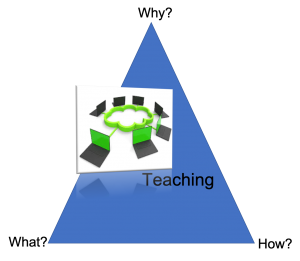In our PBL group we discussed open access and digital teaching/learning in the three perspectives of openness relate to:
- individual (teacher – student)
- organizational (universities)
- Societal (e.g. societal justice)
But, of course, the three perspectives are intertwined and are not easily separated. For the individual teacher and/or student the organizational aspects are essential for getting access, having control over and being able to take part of essential. This is also true for the societal aspects of digital teaching and learning. Who benefits from the establishment of digital teaching platforms and resources and who do not. In the lecture by Bali Maha, pedagogical issues connected to digital learning activities and techniques were discussed. Students’ participation and a student-centric approach to teaching as well as focusing on the learning process instead of the content when designing teaching activities. In the lecture by Bali and in connected literature a process-centric approach to Open Educational practices is thus considered a favorable approach compared to content-centric.
In relation to how to organize and design learning activities and communities online there are aspects on the societal level concerning governing, structures, economic resources and aspects concerning citizens and how the society are organized for them to having access to schooling, institutions and (of course internet). However, in this tecxt I stay with the question of teaching and learning online, and leave these questions aside for being able to focus on the learning process and the role of the teacher if teaching takes place in an online community. I have the impression that online teaching and learning communities have moved from focusing on the media and information content towards an interest in the questions of “how to communicate” (or how to teach/learn) and why (drawing on the didactic questions, what, how and why).
One example is to be found in the reasoning around the concepts of OEP (open educational practices) vs OER (open educational resources), where the OEP-perspective is more overarching and focuses on “process as opposed to content” (Koseoglu & Bozkurt 2018). The shift in focus is understood as chaning from seeing learning as manifest and instead highlighting the learning process. Thus giving more attention to learner centered practices that allow for participation and dialogue.
A process-centric approach to learning does also imply putting the learner in the center instead of teachers. If to focusing the societal perspective: Might it be a risk that this approach foremost favor strong, privileged learners? Questions coming up during Thursday 30th of March meeting: Who has voice in these platforms and communities? Those who already know what they want to learn and why, they who are used to having their voice recognized and do not feel insecure in leading their own learning process? And, what kind of knowledge is there in open learning networks online? What kind of knowledge is possible and what kind of knowledge is privileged? Maybe we need to have more critical considerations when introducing online teaching practices and how these are being taken up within higher education institutions?
Perhaps we should ask ourselves why and in what way students’ interactions with each other, and a more learner centric approach to teaching, promotes learning better than pre-created teaching activities lead by the teacher. And do the design of didactic activities online lead to that we have to take new aspects into account compared to face-to-face learning/teaching? What are the boundaries for process centric learning online? How does the process come to exist and what decides what the process comes to be?
There might be risks not taking the re-contextualisation of teaching (and learning) seriously when moving from face-to-face teaching to online learning platforms. Kate O’Conner (2022) argue in an article based on a case study of two universities introducing online learning activities in US, that this have implications for what kinds of pedagogy, curriculum structure and assessment are appropriate in this context. To quote O’Connor: “there was little acknowledgement at the institutional level of how diverse student histories and understandings might be engaged with within a context where curriculum needed to be predefined in full at the outset and little apparent concern with how such aims might be undermined within online initiatives that inhibit relations between lecturers and students.” (p.420). She also criticizes an excessive faith in the benefits from student interactions online, if not considering the ways students are engage with knowledge in a constructivist learning paradigm, especially in different learning contexts. Maybe an understanding of knowledge which emphasizes the importance of students’ active participation in learning and participation in creating knowledge (compare process-centric and learner-centric) needs to be adapted to new online platforms for learning if to be feasible.
Sources:
Bali, M., Cronin, C., & Jhangiani, R. S. (2020). Framing Open Educational Practices from a Social Justice Perspective. Journal of Interactive Media in Education.
Koseoglu, S and Bozkurt, A. (2018). An exploratory literature review on open educational practices. Distance Education, 39(4)
O’Connor, K. (2022) Constructivism, curriculum and the knowledge question: tensions and challenges for higher education, Studies in Higher Education, 47:2
Visa
April 24, 2023 — 10:30 am
Larissa, thank you for the thoughtful post and for your contribution to our work! Reflecting on what you write on student engagement, I feel that there is a big problem brewing after so much online engagement during Covid. At least in Finland students are struggling more and I think excessive reliance on online participation is one factor that contributes to the problems as it isolates students from teachers and from one another. Hopefully some critical reflection will take place in educational institutions.
Larissa Mickwitz
May 17, 2023 — 8:29 am
Yes Visa, in Sweden we have the same experiences from the covid-period. We must be aware not to loose our critical distance to online solutions. Especially since I sometimes wonder if the promotions for online teaching in society (private education institutions towards young people are today often only online) are sometimes more based on economic efficiency than on pedagogical reasoning.